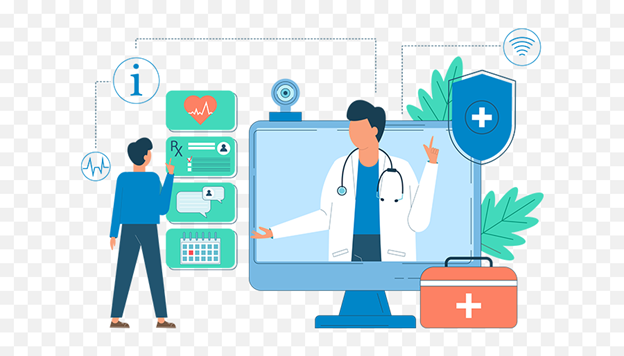The Role of AI in Modern Healthcare
In addition to aiding in medication management and monitoring, artificial intelligence is also revolutionizing patient-doctor communication in healthcare. AI tools like chatbots and virtual assistants are being used to streamline appointment scheduling, provide real-time answers to common medical questions, and even offer personalized health advice based on individual patient data.
Furthermore, AI-powered systems can analyze vast amounts of medical information to assist doctors in making more accurate diagnoses and treatment recommendations. This can lead to faster and more effective patient care, ultimately improving outcomes and saving lives. Overall, the integration of AI into healthcare is not only enhancing the patient experience, but also increasing the efficiency and effectiveness of medical professionals. As technology continues to advance, we can expect to see even more innovative ways in which AI will continue to reshape the healthcare industry for the better.
AI Chatbots in Patient Care
The emergence of AI chatbots in the healthcare industry represents a significant advancement in how patients interact with healthcare providers. These chatbots are designed to mimic human conversations, providing patients with a more personalized and efficient way to access healthcare services. By leveraging AI technology, healthcare organizations are able to enhance patient engagement and improve the overall quality of care.
One example of the successful integration of AI chatbots in healthcare is Duke Health’s AI Innovation Lab in North Carolina. This initiative was launched to support healthcare providers in managing the growing number of patient inquiries and requests. Through the use of AI chatbots, doctors are able to streamline communication processes and prioritize patient care more effectively. Another notable example is Northwell Health’s text-based chat service in New York, which offers patients a convenient and personalized way to interact with their healthcare providers.
By utilizing AI technology, Northwell Health is able to deliver tailored care plans based on each patient’s unique health condition and medical history. This personalized approach not only enhances the patient experience but also leads to better health outcomes. Overall, AI chatbots have the potential to revolutionize the healthcare industry by improving communication, increasing efficiency, and delivering more personalized care to patients.
As technology continues to advance, we can expect to see even more innovative uses of AI chatbots in healthcare, ultimately leading to a more patient-centered and efficient healthcare system.

The Future of AI in Healthcare
AI technology in healthcare is revolutionizing the way doctors interact with their patients. Not only does it make their lives easier by streamlining administrative tasks, but it also has a significant impact on the overall quality of patient care. Take, for example, the MyChart patient portal at UC San Diego Health.
This innovative platform utilizes an AI chatbot to draft responses to non-emergency patient queries. By doing so, it saves valuable time for both doctors and patients, allowing healthcare providers to focus on more pressing matters. What sets this AI technology apart is that the responses generated by the chatbot are always reviewed by a clinician before being sent to the patient.
This ensures accuracy and adds a human touch to the interaction, which is crucial in healthcare where empathy and understanding are paramount. By enhancing communication between doctors and patients, AI technology is fostering better engagement and ultimately improving the overall patient experience. This not only benefits the individual patient but also contributes to a more efficient and patient-friendly healthcare system as a whole. As AI continues to advance in the medical field, the possibilities for improved patient care are endless.
Benefits:
Improved Patient Health: AI technology has revolutionized the way patients manage their health by providing tools like the MyChart patient portal. This technology not only simplifies complex medication schedules for patients but also actively monitors their health status. By analyzing data and detecting any early signs of trouble, AI can alert clinicians promptly, allowing for timely intervention and ultimately leading to improved patient outcomes. The integration of AI in healthcare systems has undoubtedly enhanced the overall quality of patient care and has the potential to further revolutionize how we approach healthcare in the future.
Increased Efficiency in Medical Care: AI chatbots are revolutionizing the healthcare industry by providing doctors with a tool to streamline patient queries and administrative tasks. These chatbots can quickly provide answers to common questions, schedule appointments, and even provide basic medical advice. By taking on these routine tasks, AI chatbots allow doctors to spend more time focusing on providing quality patient care, ultimately improving the overall patient experience. Additionally, by automating these administrative tasks, doctors can reduce their workload and prevent burnout, leading to a more sustainable and fulfilling career in healthcare. Overall, AI chatbots are transforming the way doctors manage patient queries, making it easier and more efficient for healthcare providers to deliver high-quality care to their patients.
Enhanced Doctor-Patient Communication: AI technology plays a pivotal role in revolutionizing the healthcare industry by enhancing communication between doctors and patients. With the ability to analyze vast amounts of data and provide valuable insights, AI can assist medical professionals in making informed decisions and delivering personalized care to patients. By streamlining communication processes and reducing the risk of miscommunication, AI technology can ultimately lead to better health outcomes and increased patient satisfaction. Furthermore, AI-powered tools such as chatbots and virtual assistants can provide patients with round-the-clock support and guidance, allowing them to access medical information and advice at their convenience. This not only improves the patient experience but also helps to alleviate the burden on healthcare providers by automating routine inquiries and administrative tasks. In addition, AI technology can help doctors identify patterns and trends in patient data, enabling them to proactively address potential health issues and prevent complications. By leveraging predictive analytics and machine learning algorithms, healthcare professionals can improve their diagnostic accuracy and treatment efficacy, ultimately leading to better patient outcomes. Overall, the integration of AI technology into healthcare systems has the potential to transform the way doctors and patients interact, making communication more efficient, personalized, and effective. As the field of AI continues to advance, we can expect to see even greater improvements in healthcare delivery and patient care.
AI technology has made great strides in revolutionizing healthcare, offering exciting opportunities to improve patient outcomes and streamline processes. However, it’s essential that this powerful tool is used responsibly and ethically. Incorporating AI into healthcare requires a comprehensive engagement strategy that prioritizes patient comfort and understanding. Patients should feel informed and empowered when interacting with AI technology, knowing how it will benefit their care without compromising their privacy. Transparency is key in building trust with patients. Healthcare providers must clearly communicate how AI will be used to collect and analyze their information, ensuring they feel confident in the security and confidentiality of their data. By approaching AI implementation thoughtfully and cautiously, the healthcare industry can harness the full potential of this technology to provide more efficient, effective, and patient-centered care. Through a combination of innovation and responsible practices, AI has the capability to transform healthcare in ways we never thought possible.










